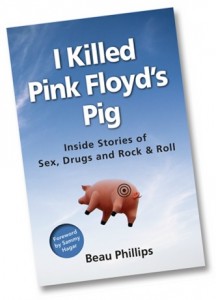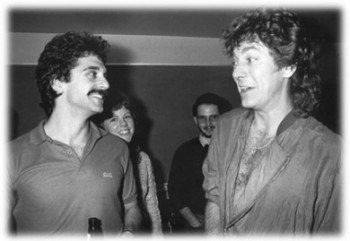Many of you know Beau Phillips – a guy who has held some amazing positions in media, from MTV to Dial Global. But Beau cut his teeth in the business as a program director of great rock stations, notably KISW/Seattle from 1978-92 – truly golden years for the business and the format. His new book, I Killed Pink Floyd’s Pig, is a collection of rock n’ roll radio stories mostly from that era.
In reading the book and enjoying the stories as only a former PD could, it occurred to me that the vibe and the relationship that flourished between radio and records “back in the day” has been corroded by time. I asked Beau to think about his stories through that lens, and his guest post appears below. – FJ
 In rock radio’s heyday, stations competed for your affection. Battling against other stations got our creative juices flowing and kept us sharp. Having strong competitors made us all better and gave listeners a smorgasbord of entertaining options. It was an era when rock was great and the music industry thrived. Back when gas was cheap. When Michael Jackson was black. When SNL was funny. When disco sucked. It was the perfect storm of exciting bands, robust record labels, savvy concert promoters and destination record stores. And the engine that drove this rock revolution was radio. Together, we helped to break bands on a national scale.
In rock radio’s heyday, stations competed for your affection. Battling against other stations got our creative juices flowing and kept us sharp. Having strong competitors made us all better and gave listeners a smorgasbord of entertaining options. It was an era when rock was great and the music industry thrived. Back when gas was cheap. When Michael Jackson was black. When SNL was funny. When disco sucked. It was the perfect storm of exciting bands, robust record labels, savvy concert promoters and destination record stores. And the engine that drove this rock revolution was radio. Together, we helped to break bands on a national scale.
What made this a special time? In a word, cooperation. Radio stations, labels and promoters were committed to exposing great new music. We trusted our “ears” and gave bands a shot. This pay-it-forward collaboration had never existed before, and will never happen again.
Before file sharing, Internet radio and SiriusXM, radio held all of the cards. My station, and others like KISW, played a significant role in launching music careers – and artists knew it. To show their thanks, bands would often visit our station and award us with gold record plaques. Some invited us to their concerts followed by backstage after-parties…and more. It was decadent, wild and often outrageous. Those days are long gone. But it was fun while it lasted.
Today, record stores are a distant memory. Record labels have lost their relevance. Concert promoters have been sterilized by their new corporate owners. And sadly, radio has lost most of the fun and creativity that once made it special. What remains are cardboard cut-out replicas that are devoid of personality and passion. There’s a good chance that your favorite radio station is a soulless hard drive, and the DJs pre-record voice tracks from thousands of miles away. Gone are the days of music discovery and the sense of wonder that came from discovering an exciting, new artist.
As a result, artists rarely visit radio stations any more. Some radio people still get free concert tickets and maybe a quick handshake after the show. Wild backstage parties have been replaced by stilted, command appearances. Booze has been swapped for water bottles. Groupies have been replaced by corporate sponsors looking for a trophy photo to hang in their offices. Execs are herded into a sanitized room where they’re paraded through a reception line, meeting bored band members just looking for an exit. Taylor Swift often hosts five such events before every performance, rushing from room-to-room, appeasing Cover Girl, T-Mobile, and assorted VIPs. All of the fun and spontaneity has been surgically removed. It’s all business now.

In my book, I Killed Pink Floyd’s Pig, I share dozens of funny and outrageous experiences that I enjoyed with rock superstars. After hearing my tales of sex, drugs and rock & roll, radio people often shake their heads in disbelief saying, “Wow, it must have been fun back then. We rarely meet bands anymore, and it’s certainly not like that. Now I feel depressed, like I got into radio too late and missed the party.”
Post-script: Beau’s depiction of the backstage and behind-the-scenes antics of the radio and record communities at times feels like watching a movie from the ‘80s. And yet, radio’s “secret sauce” in those days was its ability to connect artists with fans, creating amazing experiences along the way. In a world of satellite radio, pure-plays, music on hard drive and in the cloud, the radio and record industries that used to collaborate now find themselves at odds over many issues – both to their mutual detriment. It truly is a shame for stations, musicians, and of course, the fans.
To connect with Beau, email him here. If you’d like to buy his book, it’s available on Amazon here.
And if you’d like an autographed copy of the book, take your best shot at a snarky or clever caption for the photo at right, submit it in our “comments” section, and we’ll pick the appropriate winner.
- What To Do If Your Radio Station Goes Through A Midlife Crisis - April 25, 2025
- A 2020 Lesson?It Could All Be Gone In A Flash - April 24, 2025
- How AI Can Give Radio Personalities More…PERSONALITY - April 23, 2025




Hey Beau…wanna know how awesome it is to be a rock star? Think of the four best looking girls you’ve ever met. Got a good clear picture of them in your mind? I wouldn’t f**k any of them!
Great post! Can’t wait to read the book (& maybe share it with my Music Business undergrad students).)
caption for photo: Robert Plant is telling Beau:
“Freddy Mercury just called me. He asked me to tell you that he wants his mustache back.”
That could be the winner! Thanks for the note, Greg.